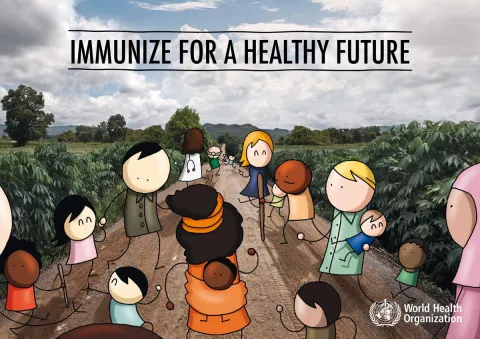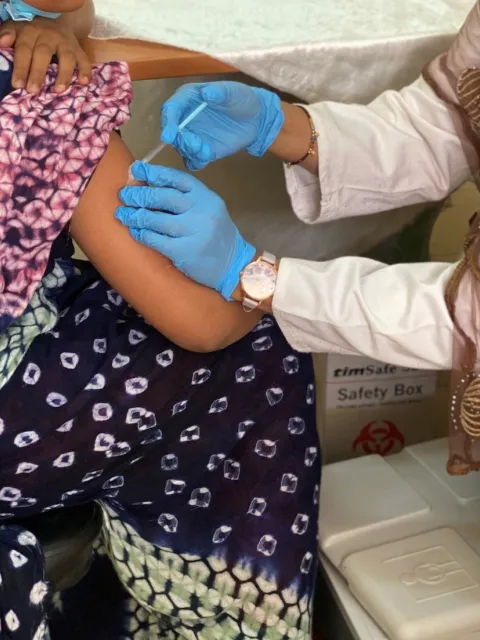World Immunization Week
Tomorrow start World Immunization Week, spread the word!

World Immunization Week – celebrated in the last week of April (24-30) - aims to promote one of the world’s most powerful tools for health – the use of vaccines to protect people of all ages against disease. The theme for 2014 is “Are you up-to-date?”.
Protection throughout life
Immunisation is widely recognised as one of the most successful and cost-effective health interventions ever introduced. It prevents between 2 and 3 million deaths every year and now protects children not only against diseases for which vaccines have been available for many years, such as diphtheria, tetanus, polio and measles, but also against diseases such as pneumonia and rotavirus diarrhoea, two of the biggest killers of children under 5. Furthermore, adolescents and adults can now be protected against life-threatening diseases such as influenza, meningitis, and cancers (cervical and liver cancers), thanks to new and sophisticated vaccines.
Chronic infections are estimated to be the cause of around 16% of all cancers globally, with this figure rising to almost 23% in developing countries. Several of the most common cancers in LMICs such as liver and cervical cancers are associated with infections with hepatitis B virus (HBV) and the human papillomavirus (HPV), respectively. This causal link between infection and cancer opens up opportunities for preventing these cancers with safe and effective vaccines now available against both HPV and HBV infection. A recent article from the Guardian mentioned that the HPV vaccine dosage can now be reduced to two shots instead of the three recommended, this advised by the World Health Organisation's expert advisory group (Read article here), which increases the immunisation coverage.
For a few years now, UICC has also been advocating for universal vaccination programmes covering cancer causing infections (HPV and HBV) as stated in Target 04 of the World Cancer Declaration (2013 rereshed version). To learn more, please download the World Cancer Declaration 2013 refresh.
Despite this success, 1 in 5 children are still missing out. In 2012 an estimated 22.6 million infants were not reached with routine immunisation services. More than half of these children live in just 3 countries: India, Indonesia and Nigeria. Inadequate supply of vaccines, lack of access to health workers, and insufficient political and financial support account for a large proportion of people who start but don’t finish national immunisation schedules. A lack of knowledge about vaccination, on the other hand, is one of the key reasons why adults consciously choose not to get vaccinated themselves or to vaccinate their children.
Are you up-to-date?
This year’s World Immunization Week campaign seeks to address the knowledge gap which can prevent people from getting vaccinated.
Specific goals are for people around the world to:
- know what vaccines are available to protect against disease;
- be motivated to check the vaccination status of themselves and their families; and
- get the vaccines they need from their local health practitioner.
Increasing public understanding of the benefits of vaccination is a key objective of the Global Vaccine Action Plan (GVAP), which provides the framework for immunisation efforts across the world and was endorsed by the World Health Assembly in 2012. The Plan aims to improve health by extending by 2020 and beyond the full benefits of immunisation to all people, regardless of where they are born, who they are, or where they live.
Use of mobile and internet technologies are encouraged as an alternative to or in addition to poster campaigns and events such as public information sessions and media workshops.
More information:
- Immunization, vaccines and biologicals
- Global Vaccine Action Plan 2011-2020
- Fact sheet on immunization coverage
With the slogan “Immunize for a healthy future: Know, Check, Protect” for this year’s World Immunization Week, the World Health Organization (WHO) encourages you to check whether you and your family are up-to-date with the vaccines you need. Help them spread the word by choosing one or more posters from their online, multilingual toolbox. Print, post in your office, school, or health-care centre, and share on social media to make this year’s campaign truly global.
Check the Youtube video by clicking here.
To learn more, please visit the WHO website by clicking here.
Last update
Friday 07 June 2019
